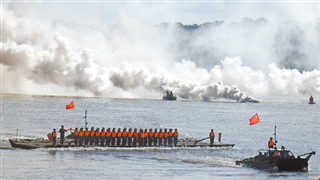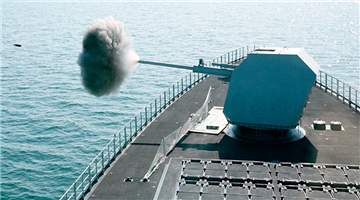By Xinhua writers Wang Aihua, Shi Longhong, and He Zili
TAICHUNG, Taiwan, Aug. 31 (Xinhua) -- In a black-and-white family photograph from 1928, an old lady sits in the middle of her 100-some descendants, all dressed in traditional Chinese clothes of gowns and mandarin jackets, in front of their residence in central Taiwan.
The photograph was taken to celebrate the woman's 80th birthday, about 30 years after Taiwan was ceded to Japan by the then Qing government of China in an unfair treaty in 1895.
"My great-grandmother insisted that they all wear Chinese clothes, even though the Japanese had ruled Taiwan for decades by then," said 69-year-old Lin Kuang-hway, a fourth-generation descendant of the woman.
The photo is now hung on the wall of a living room in the residence of the Lin family, a prominent family in Taiwan that has been known for fighting foreign aggressions, including the Japanese, since the late 19th century.
The residence, an 11,000-square-meter compound of traditional Chinese architecture situated in Wufeng, Taichung, consists of several courtyards that are now open to tourists. A small part of it is still inhabited by some members of the Lin family.
Pointing to the main gate of the compound, Lin Kuang-hway said it faces the west rather than the south as local buildings are usually built. "This was particularly designed to mean that we are facing our motherland," he said.
The Lin family came to Taiwan nearly 300 years ago from Fujian Province in the mainland, which is just across the Taiwan Strait. Generations of the family made their names known in different areas, from civil service to military affairs and literature.
After Taiwan was ceded to Japan after the First Sino-Japanese War, Lin Chao-tung, Lin Kuang-hway's great-grandfather who was then a military leader, was determined to fight the Japanese but was stopped. He was forced to leave Taiwan for Fujian and died in the mainland years later without returning to the island again.
However, Lin Chao-tung's son Lin Tsu-mi came back to Taiwan and sponsored locals to fight the Japanese. In 1913, Lin Tsu-mi became the first person in Taiwan to renounce Japanese nationality and went back to the mainland.
In the mainland, Lin Tsu-mi also supported Sun Yat-sen in his revolutionary cause. He later became commander of Sun's military force in Fujian but was killed by warlords in 1925.
"Giving up the Japanese nationality meant most of my grandfather's estates in Taiwan were either confiscated or bought at low prices by the Japanese, but he did it anyway," said Lin Kuang-hway.
After the breakout of the Lugou Bridge Incident in 1937, which marked the start of Japan's all-out aggression against China, Lin Tsu-mi's son Lin Cheng-heng fought one of the major battles against Japanese invasion in south China's Guangxi and then joined the Chinese Expeditionary Forces in Myanmar against the Japanese.
Besides fighting in battles, several other prominent members of the Lin family engaged in resistance against the Japanese in other forms, including Lin Hsien-tang who co-founded several sociopolitical initiatives against Japanese rule, and poets Lin Tsao-sung and Lin You-chun who wrote about the pain caused by Japanese rule.
"Our family fought the Japanese for half a century," said Lin Kuang-hway. "We feel really proud of our ancestors' sacrifice."
For the past two decades or so, Lin Kuang-hway has been dedicated to telling his family's stories, both in Taiwan and the mainland. "I feel it's my mission to make our family's history known to more people."
In 2007, Lin Kuang-hway founded an association of relatives of anti-Japanese patriots in Taiwan. He has visited the mainland often to share the history of Taiwan people's fight against the Japanese.
"To me, our family is a bond between the mainland and Taiwan," Lin Kuang-hway said.











